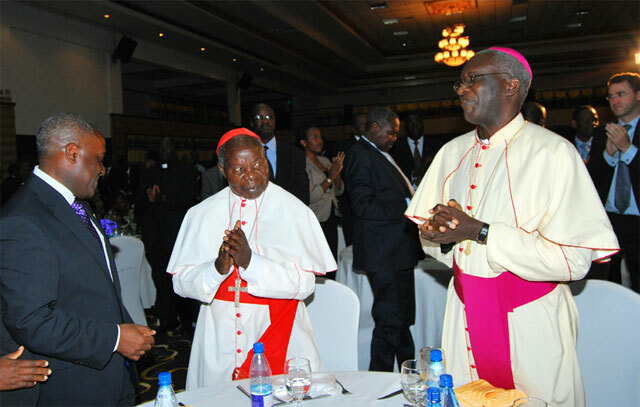Clergy at risk of political threats - Lwanga
Apr 01, 2012
Church leaders face being framed by political scoundrels on charges of rape, defilement, incest and illegal possession of guns if claims by the Archbishop of Kampala are to be taken seriously.

By Conan Businge and Juliet Lukwago
Church leaders face being framed by political scoundrels on charges of rape, defilement, incest, molestation and illegal possession of guns if claims by the Archbishop of Kampala Cyprian Kizito Lwanga are to be taken seriously.
During the memorial lecture for Archbishop Joseph Kiwanuka Friday night, Lwanga told the Vice President Edward Sekandi that an anonymous letter threatening his priests was dumped at his gate.
The letter claimed, he said, that most anti-Government elements in Kabale district and Kigezi sub-region are being led by the Catholic laity and clergy. The anonymous letter specifically mentions priests and nuns.
The letter read further: “They [Church leaders] have come out openly to criticize Government. To curtail this, I have designed a strategy of framing up criminal charges against them.”
Among the crimes stated in the letter are rape, defilement, incest, molestation and illegal possession of fire arms.
“I have aligned some females to act as complainants. I have recruited some boys,” added the anonymous letter which His Grace handed over to the VP for investigations.
“This is a covert and strenuous operation that needs urgent and prompt facilitation. This issue of planting guns in some selected respective residences may not work soon as my boss cannot be cooperative and is bathing in the same pond with them,” read the letter.
In reaction to the anonymous mail, the Archbishop said: “If this statement is indeed what they are planning to do, one wonders what type of nation we are building.”
However, the Vice President, when he took to the floor to speak, did not respond to the anonymous letter and calls for the investigation of the matter.
 Emmanuel Katongole (left) recieved a standing ovation before his lecture. Cardinal Emmanuel Wamala (centre) was also at the memorial. PHOTO by Juliet Lukwago
Emmanuel Katongole (left) recieved a standing ovation before his lecture. Cardinal Emmanuel Wamala (centre) was also at the memorial. PHOTO by Juliet Lukwago
The memorial lecture was delivered by Emmanuel Katongole, a man who was four years of age at the time Archbishop Kiwanuka died.
Born of a night porter and a church cook, Katongole has grown into one of the country’s leading entrepreneurs. He is the founder and Chief Executive Officer of Quality Chemicals Industry, manufacturers of drugs in the region.
In his lecture which earned him a standing ovation from the entire hall amidst thunderous applause when he later took his sit, Katongole noted that Archbishop Kiwanuka formed a massive foundation for the Catholic Church on the continent.
Like Archbishop Kiwanuka has been warned by his superiors in Rome, he did his work well, according to Katongole.
After his consecration, Dr. Kiwanuka was told by Rome that, “The success of your Vicariate (territorial jurisdiction) will be considered success for the entire continent of Africa and will be followed by creation of numerous local churches led by African Bishops; while your failure will mean delay in the advancement of the church of Africa.”
Archbishop Joseph Nakabaale Kiwanuka was the first native African to be ordained a Catholic bishop in modern times.
In January 1961 he was appointed Archbishop of Rubaga upon the retirement of Archbishop Joseph Cabana, and in October of the following year played a prominent role in the celebrations accompanying the attainment of political independence in Uganda.
Later, Kiwanuka went to Rome to attend the sessions of the Second Vatican Council 1962 to 1965.
During the third session of the Council, Bishop Kiwanuka assisted Pope Paul VI at the canonisation of the 22 Catholic Martyrs of Uganda on October 18, 1964.
He served on the Buganda Constitutional Committee in 1955 and authored the influential pastoral letter, "Church and State," which urged democratic maturity and rule of law as the nation sought independence.
